Are universities at risk of just becoming hotels for researchers?

The chair person, Professor Majken Schultz, presented the white paper at the annual meeting for the Committee on Science Policy. (Photo: The Royal Academy of Science and Letters)
More funding for research is set aside for specific fields or types of research. This leaves less room for researchers to be innovative and can potentially turn universities into just “hotels for researchers,” argues Professor Majken Schultz. Together with the Committee on Science Policy from the Royal Academy of Science and Letters, she has written a white paper with recommendations on how to ensure freedom of research, which is otherwise at risk of becoming yet more controlled.
For the last decade, funding from private foundations for research conducted at public institutions has more than doubled, while public funding has stagnated. And while you might think that more money for research is a good thing, money is never just money.
According to a white paper about freedom of research in Denmark by the Committee on Science Policy, the money allocated to research today is often tied up in short-term projects and focused on certain fields of research. This results in fewer funds for projects with long-term perspectives that arise from a researcher’s own curiosity, argues the recently retired chairperson of the committee, Professor Majken Schultz from CBS, who was the first researcher from CBS to chair the committee.
“The largest research foundation, the Novo Nordisk Foundation, can’t, for obvious reasons, fund research within literature or social sciences. The Innovation Fund Denmark is a public fund, but focuses on projects for applied research, whereas the Carlsberg Foundation is very focused on basic research and less restrictive with respect to the research theme. This isn’t about whether the money is public or private, but about how much money we have left for good ideas, driven by the researcher’s curiosity and participation in setting a new research agenda,” says Majken Schultz.
When the budget for research becomes even more controlled in terms of who and what the money is for, the universities are at risk of becoming “hotels for researchers”.
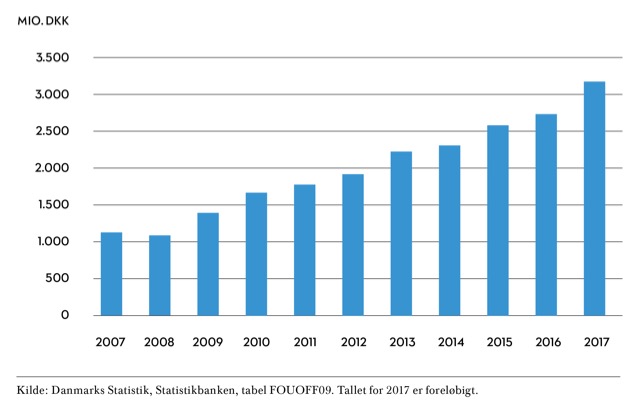
This is how much private foundations have granted to Danish research the past decade. (Illustration: The Royal Academy of Science and Letters)
“We’ve reached a point where we have to find a balance so that universities don’t turn into what we call ‘hotels for researchers’: universities that have no research funds of their own, but host researchers who conduct research based on external funding dominated by short-term projects within predefined research themes. But on the other hand, we don’t want universities to be ivory towers where researchers only think about their own interests,” she says and continues:
“The freedom of research isn’t threatened, but we need to see the current development from a long-term perspective if we want to avoid that.”
Get out of the postdoc swamp
Every year, the Committee on Science Policy, which was set up by the Royal Academy for Science and Letters (Videnskabernes Selskab), publishes a white paper about Danish research and its contributions to Danish society. The white paper is presented at the annual meeting at which politicians, the Minister of Higher Education and Science, researchers and members of the leading public and private research institutions are invited to discuss it.
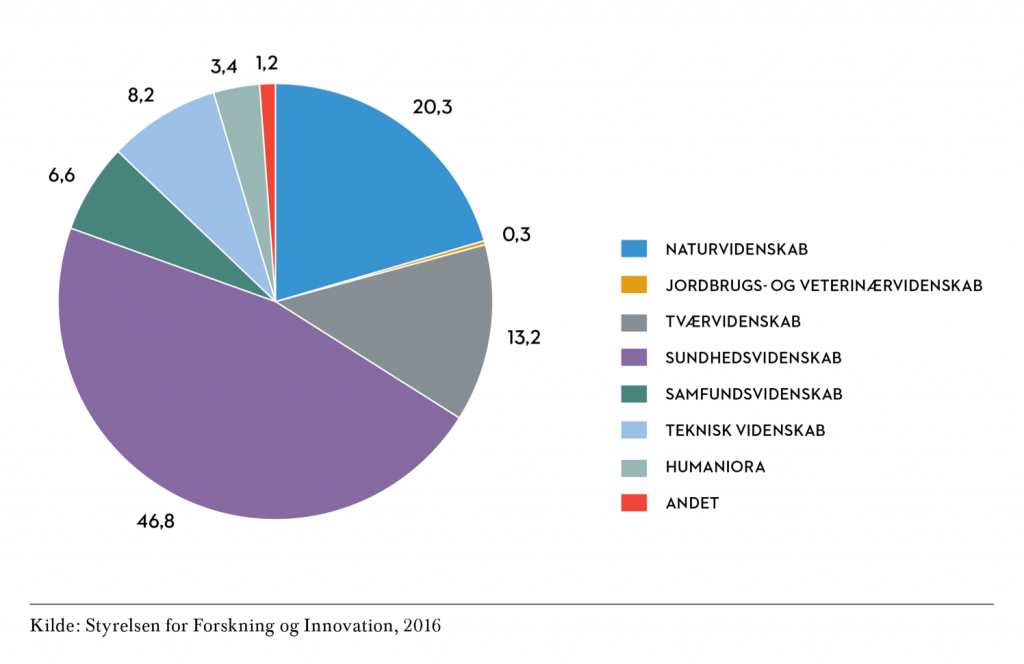
This is how private foundations invest their money. Blue: Natural sciences. Yellow: Veterinary and agricultural science. Grey: Cross-disciplinary science. Purple: Health science. Green: Social sciences. Light blue: Technical sciences. Light green: Humanities. Red: Other.
This year, the white paper revolved around the topic ‘freedom of research’ and, according to Majken Schultz, retail-controlled research has consequences on different levels.
“If you take a look from the inside, researchers talk about the postdoc swamp. Postdoctoral researchers are employed on short-term contracts and have a hard time securing permanent employment. It’s hard to be free if you depend on project funding all the time. This is the case despite there being a lot of focus on young researchers,” she says.

If we look back in time, there are several great examples of research that came about as a result of unlimited curiosity. Our own H.C. Ørsted was the first to discover electromagnetism, and Scottish scientist Alexander Fleming discovered penicillin by pure coincidence. Although they don’t have much in common, there’s at least one thing that connects them, argues Majken Schultz.
“The greatest and most important discoveries weren’t made because of predictions. What’s the chance of finding something new if someone determines your research? The nature of research is to ask questions based on disciplined inquiry. So, if you want growth and wealth in society, you need to be open and ready to take risks. That won’t happen if others are deciding the research topics for you,” says Majken Schultz.
And then there’s another thing: Research takes time. And great research often takes more time. This collides with the short-term funding provided by different foundations, public or private.
“It doesn’t matter whether it’s about humanities or molecules. Research that moves us forward takes time, and it’s hard to do that kind of research based on three- to five-year funding. Great discoveries and a new research agenda are often built on the effort of generations; it’s not done in a couple of years. Foundations and research councils enjoy changing the topic of research, and that may be good in some respects, but it’s rarely an advantage in the pursuit of novel, excellent basic research,” says Majken Schultz.
A revolution on its way?
Majken Schultz is the first researcher from CBS to chair the Committee on Science Policy, and some members of the Royal Academy of Science and Letters probably expected her to choose a topic for this year’s white paper that is more aligned with what CBS is known for: having close partnerships with the business sector. But this wasn’t the case.

“It felt right as a professor from CBS to take up a fundamental question in research policy. These issues are also highly relevant for CBS, which in recent decades has turned into a leading international research institution. But by choosing the topic of freedom of research, you draw attention to an issue that is equally relevant in all areas of research – although there are huge differences in how much private funding is available in various areas of research,” she says. Social sciences receive about eight percent of total private funding for research in Denmark.
So, what now? What’s the aim of the white paper? To shake up the politicians and ask them to adopt the recommendations?
“There’s an election coming up, and we’ll try to convince the politicians to put money into basic research guided by the universities. I’m not expecting a revolution, but at the annual meeting I experienced inquisitiveness and an acknowledgement that if we want to keep private funding, the minister needs to step up. Novo Nordisk and others can’t fund Danish research alone,” she says.
One thing that the research community was criticized for at the annual meeting was that they have a hard time speaking with one voice. This can make it difficult to get science and research on the agenda if the universities, faculties and even the departments can’t agree on certain things. This can result in a common voice that is a little blurry and maybe quite abstract.
However, for this white paper, the Committee on Science Policy has, according to Majken Schultz, tried to be as concrete as possible in order to make things happen.
“We haven’t always been good at speaking with one voice, but I hope this white paper will be a spokesperson for all of the different fields of research, and I think we’ll see more of this,” she says.




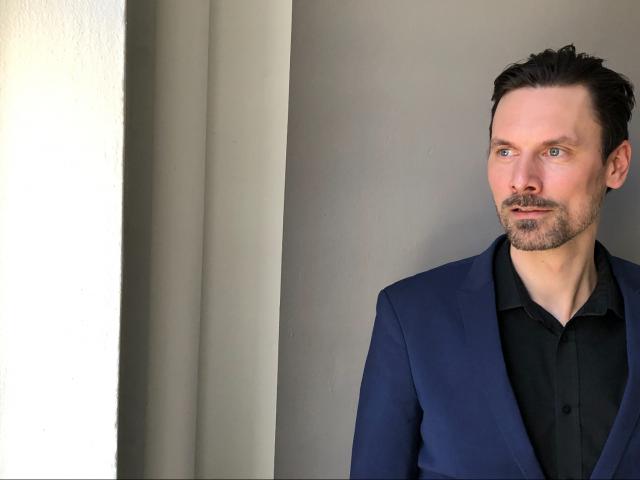
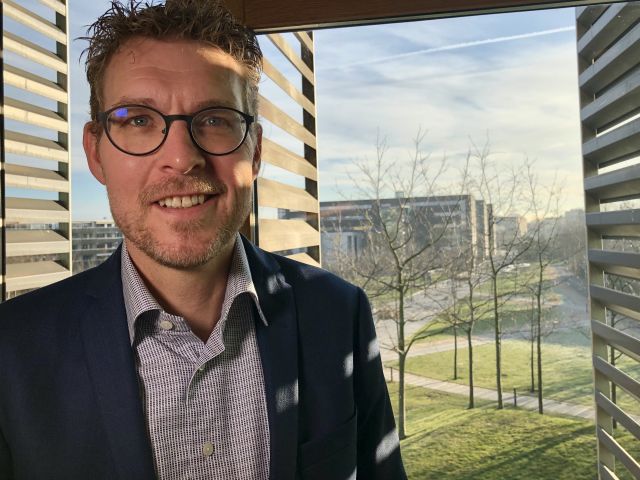
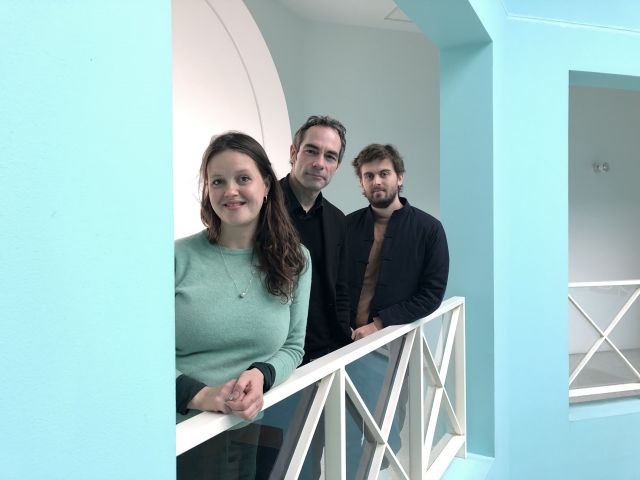






























































































































Comments